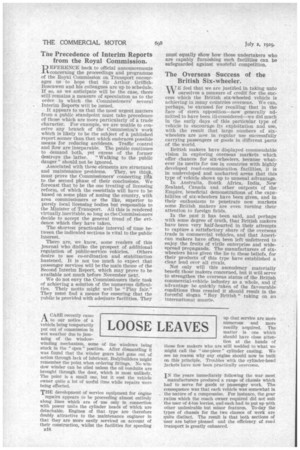The Overseas Success of the British Six-wheeler.
Page 44

If you've noticed an error in this article please click here to report it so we can fix it.
wE feel that we are justified in taking unto ourselves a measure of credit for the success which the British six-wheeled vehicle is achieving in many countries overseas. We can, perhaps, be excused for recalling that in the face of stern opposition—now generally admitted to have been ill-considered—we did much in the early days of this particular type of vehicle to encourage its exploitation and use, with the result that large numbers of sixwheelers are now in regular use successfully carrying passengers or goods in different parts of the world.
British makers have displayed commendable vision in exploring overseas markets which offer chances for six-wheelers, because whatever its merits for use in countries with highly developed road-communication facilities, it is in undeveloped and uncharted areas that this type of vehicle shows up to unusual advantage.
In Australia, South Africa. India, New Zealand, Canada and other outposts of the Empire, beneficial demonstrations of the capabilities of six-wheelers have been given, and in their enthusiasm to penetrate new markets some British makers are even turning their attention to foreign fields.
In the past it has been said, and perhaps with some degree of truth, that British makers have been, very half-hearted in their attempts to capture a satisfactory share of the overseas trade in commercial vehicles, and that American makers have often been left unfettered to enjoy the fruits of virile enterprise and widespread propaganda. The manufacturers of sixwheelers have given the lie to these beliefs, for their products of this type have established a clear lead over all rivals.
Not only will this ascendency materially benefit those makers concerned, but it will serve to strengthen the overseas status of the British commercial-vehicle industry as a whole, and if advantage be quickly taken of the favourable conditions thus created it should result in the forceful slogan "Buy British " taking on an international mantle,




















































































































